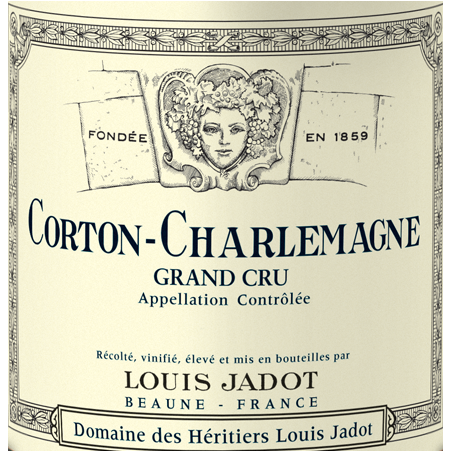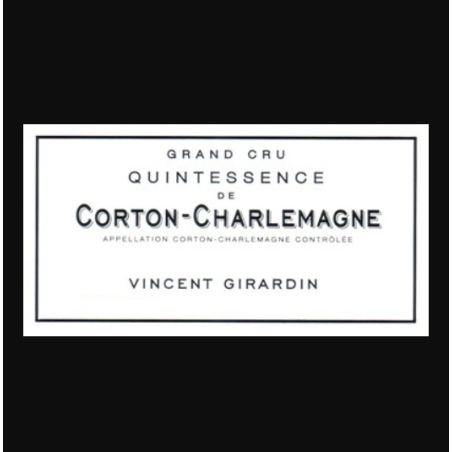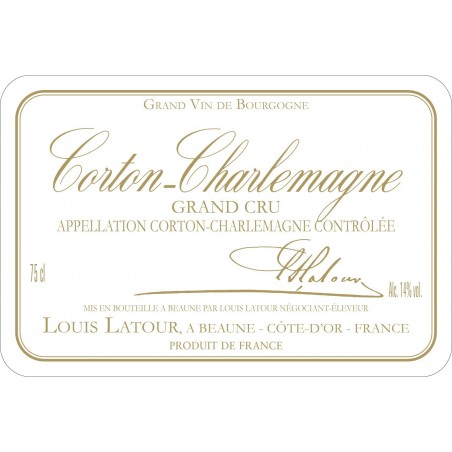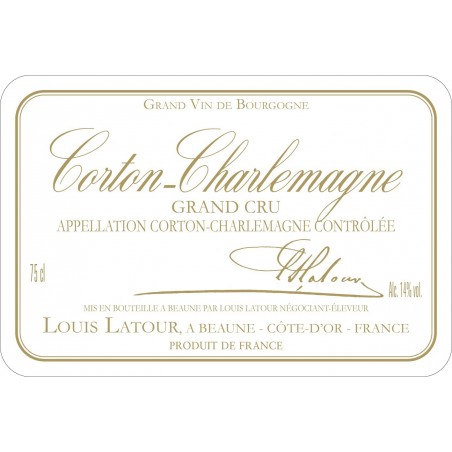6 produits




6 produits
Corton-Charlemagne is the appellation Grand Cru of white wines from the hillside of the Montagne de Corton, in the Côte de Beaune region of Burgundy. The appellation was introduced in 1937 and covers the three surrounding communes of Aloxe-Corton, Ladoix-Serrigny and Pernand-Vergelesses. It is essentially synonymous with the lesser-used Charlemagne appellation, which covers only the vineyards of Aloxe-Corton and Pernand-Vergelesses. There are approximately 52 hectares of vineyards authorised to use one or both of the two appellations contrôlées.
Emperor Charlemagne is said to have ordered the planting of the first white grape varieties on the Corton hill. The red wines he loved so much stained his long white beard and his wife (one of several) would have forced him to drink white wines instead. These would not necessarily have been made from the Chardonnay grapes used today. They are more likely to have been a blend of Pinot Gris (known locally as Pinot Beurot), Pinot Blanc and Aligoté. Only after phylloxera in the early 19th century did Chardonnay become the dominant grape variety in the great white wines of Burgundy. Aligoté and Pinot Blanc are still allowed in the wines of Corton-Charlemagne, albeit in a limited way.
The hill of Corton is itself a large limestone outcrop, slightly apart from the main escarpment of the Côte d'Or. It marks the northern end of the Côte de Beaune and abruptly stops the plain sown with vines that flows north of Beaune. The top of the diamond-shaped hill is covered with dense forest, considered a crucial element of the mesoclimate. In 2017, rumours that the 66 ha site was to be sold and possibly developed with other vineyards led producers to join forces to preserve its survival.
The trees are replaced by vines from about 345 metres (1130 feet) upwards. The vines occupy the slopes of the hill for most of its circumference, although the classification Grand Cru covers only the southern half of the hill, sweeping majestically from east to west. The places known as "Le Charlemagne", "Les Pougets" and "Les Languettes", oriented from south-west to south-east, are responsible for most of the production of Corton Charlemagne. However, while the red wines of the Corton appellation generally bear the name of a specific Climat, this is not the case for Corton-Charlemagne, which probably reflects a greater homogeneity between the three parcels.
The clayey topsoil eroded from the top of the slope closest to the trees, leaving a mixture of limestone and marl more suited to white grapes, the historical source of Corton-Charlemagne. Further down the slope, there is more clay, iron, scree and fossil-rich soil more suited to pinot noir. The east side is a little warmer - more exposed to the morning sun - and richer in marl, which is so well suited to pinot noir.
Corton Charlemagne is considered one of the best white wines of Burgundy. It is renowned for its combination of fruit flavours (figs and baked pears) and mineral character (flint) - the latter being particularly common in wines from the colder western slopes. Corton-Charlemagne is one of the most expensive white wines in the world, although it still does not reach the prices demanded by its Montrachet counterparts.
If you are looking for the best wines of the AOC Corton-Charlemagne at the best price, you have come to the right place. On Comptoir des Millésimes, find your great wines of Corton Charlemagne in the best vintages and at the best prices.
Our partners wine estate in Burgundy
Abbaye de Santenay - Alain Jeanniard - Arnoux - Blain-Gagnard - Boisson-Vadot - Bouchard Père et Fils - Bouzereau - Chantal Lescure - Château de Chamirey - Château de la Tour - Château de Marsannay - Château de Meursault - Chavy-Chouet - Clos Salomon - Comtes Lafon - Daniel Rion - Daniel-Etienne Defaix - David Duband - Domaine de la Vougeraie - Domaine de Montille - Domaine de Villaine - Domaine des Lambrays - Domaine des Perdrix - Domaine Faiveley - Domaine Germain - Domaine Joblot - Domaine Julien - Domaine Laroche - Domaine Pattes Loup - Domaine Ponsot - Dominique Laurent - Droin - Dureuil-Janthial - Fabien Coche - Fanny Sabre - Ferret - François Carillon - François Mikulski - François Raquillet - Gérard Tremblay - Ghislaine Barthod - Henri Gouges - Hubert lamy - Jacques Prieur - Jean-Marc Boillot - La Pousse d'Or - Louis Jadot - Louis Latour - Maison Leroy - Marc Colin et Fils - Méo Camuzet - Mongeard Mugneret - Moreau Naudet - Nicolas Perrault - Nicolas Rossignol - Pascal Robin - Paul Pillot - Pernot Belicard - Ramonet - Rémi Jobard - Trapet - William Fevre